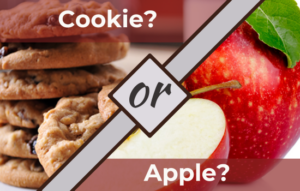
“An apple a day keeps the doctor away.” Simple and proven—eating apples does have significant health benefits. Most of us, however, do not eat an apple a day. Some of us don’t even eat an apple a month. Rather than eating apples to be healthy, we choose cookies. The actions are the same; we are still eating. The difference is that one choice has benefits that pay off later while the other only provides immediate enjoyment.
Still, we continue to choose cookies over apples. Why? The answer can be as complicated as you would like to make it. You could make it a debate on advertising and marketing, fruit sugar versus refined sugar, discipline versus comfort. Basically, the choice boils down to which makes you the happiest right now. If you gain more happiness from the anticipation of future results, you will eat the apple, but if you focus on immediate satisfaction…bring on the cookies!
Food is not the only area where we run into this problem. Finances create the same type of decision. “Start saving early and be consistent.” Simple and proven—the earlier you start saving for retirement, the easier it is to have a secure future, as long as you stay fairly consistent with your contributions and avoid early withdrawals.
Most, however, wait until late in their careers before they start putting something back for the future. Why? I believe the answers are the same as the apple versus the cookie. We know the benefits of saving early and putting something back for the future. We know the earlier we start the easier it will be, but we don’t like to give up immediate happiness for results in the distant future.
How do we correct this? Just like choosing a healthier food option, we must think about the end results of our actions. Eating the cookie tastes good now, but in a little while I will experience a sugar crash, and if I eat enough cookies I will have to purchase larger pants. Not to mention diabetes and other major health concerns. When thinking long-term over the immediate, the cookie versus apple decision becomes a little easier because our happiness is based on a longer timeline.
The same is true for savings. If we focus only on what we have to give up right now in order to save—cable, new shoes, the latest technology, Starbucks—our happiness will always go to the here and now. We will say things like, “I would, but I just don’t have the funds to set aside.” Or, “I have plenty of time for that later.”
If we think a little further down the road, about financial struggles, covering an emergency, or making ends meet in retirement without money, our happiness scale will tip towards the future.
I am not telling you to give up all immediate happiness to provide for the future, but you shouldn’t give up all of your future happiness for immediate pleasure either. This isn’t an all or nothing sort of thing. If you start early, regularly setting aside something for your future, it could really end up being a 1:5 ratio. Giving up one out of every five immediate happiness choices can go a long way…as long as you start early and are consistent. The longer you wait, the more the ratio creeps up to 3:5 or even 4:5, which will not really allow you to be happy in either immediate or future situations.
This article was previously posted in the August/September 2016 edition of ONE Magazine.


